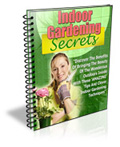Welcome to Gardening Guide
Container Vegetable Gardening Florida Article
 . For a permanent link to this article, or to bookmark it for further reading, click here.
. For a permanent link to this article, or to bookmark it for further reading, click here.
Fall Vegetable Gardening: Gardening Longer
from:Are you considering fall vegetable gardening? There are many wonderful benefits to gardening in this manner. Anyone that is looking for a way to prolong the type of gardening that they love to do can consider this type. What is fall vegetable gardening? In short, it is a type of gardening that will prolong your growing season. You will make an additional planting of vegetables that will tolerate cooler weather longer in the summer months that you can then harvest in the early to late fall. Itís a method to making sure you have fresh produce from your own garden for a longer period of time.
Whatís Important To Know
There are several key important issues when it comes to fall vegetable gardening. First off, consider what type of vegetables you can plant during this type of garden. You can plant cauliflower, Brussels sprouts, broccoli, carrots and many more. Some lettuces can do well in fall weather too; even better then they would do in the summer months. But, to make the most of gardening during this time of the year, youíll need to dedicate yourself to a few extra tricks of the trade.
One thing to do when preparing for fall vegetable gardening is to plan in advance. Since most vegetables take at least 60 to 80 days to mature, youíll need at least that amount of time to get the full benefit from the plants during the fall months. That would mean that your planting of a fall vegetable gardening area to your garden will need to go down by the beginning of August at the latest if you live in a warmer growing season. In cooler growing seasons, even July to late July planting may be necessary to consider.
To know when your necessary timing needs to be, learn when your average frost date is. Youíll need to make sure that your plants are given enough time before that frost to actually kick in. In some areas of the country, that will be early October while in other areas it isnít until the end of November.
For fall vegetable gardening, planning will be the ultimate key to success. Spend a few minutes finding the right vegetables to grow in your area. Determine when you frost dates are and plan carefully around them to allow for enough time to avoid the frost. Finally, take the time to enjoy the ability to get fresh produce right from your own garden for a longer period of time. Fall vegetable gardening is a rewarding and even a budget benefiting tool that not enough people take advantage of.
Container Vegetable Gardening Florida News



